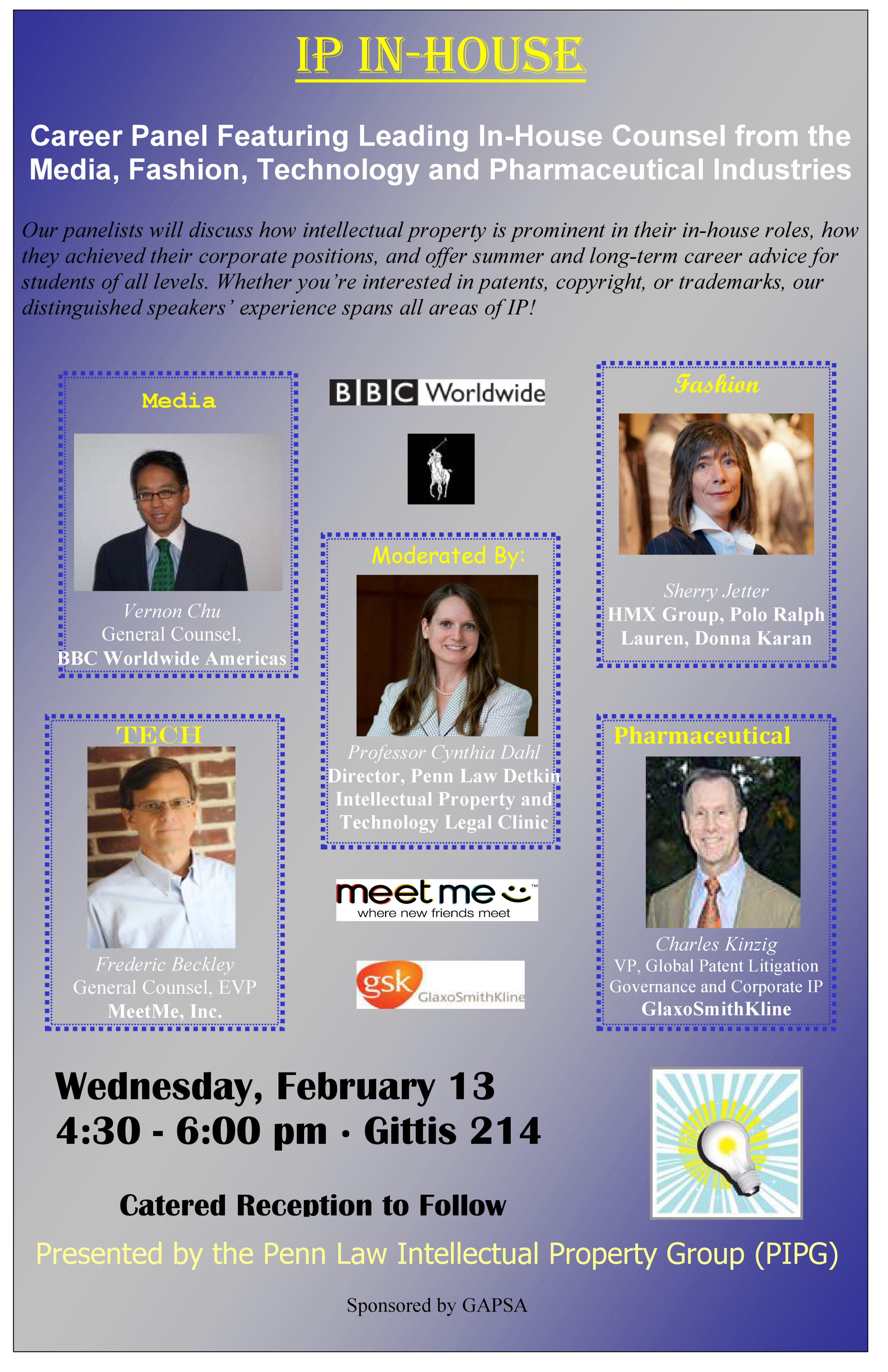 Penn Law Intellectual Property Group (PIPG) is proud to present a career panel featuring leading In-House Counsel from the Media, Fashion, Tech & Pharmaceutical Industries. Our panelists will discuss how intellectual property is prominent in their in-house roles, how they achieved their corporate positions, and offer summer and long-term career advice for students of all levels. Whether you’re interested in patents, copyright, or trademarks, our distinguished speakers’ experience spans all areas of IP!
Penn Law Intellectual Property Group (PIPG) is proud to present a career panel featuring leading In-House Counsel from the Media, Fashion, Tech & Pharmaceutical Industries. Our panelists will discuss how intellectual property is prominent in their in-house roles, how they achieved their corporate positions, and offer summer and long-term career advice for students of all levels. Whether you’re interested in patents, copyright, or trademarks, our distinguished speakers’ experience spans all areas of IP!
The all-star cast of speakers:
Media:
VERNON CHU
General Counsel
BBC Worldwide Americas
Fashion:
SHERRY JETTER
HMX Group, Polo Ralph Lauren, Donna Karan
Tech:
FREDERIC BECKLEY
General Counsel, EVP
MeetMe, Inc.
Pharmaceutical:
CHARLES KINZIG
VP, Global Patent Litigation Governance and Corporate IP
GlaxoSmithKline
Moderated by our very own Professor CYNTHIA DAHL,
Director
Penn Law Detkin Intellectual Property and Technology Legal Clinic
Wednesday, February 13th. 4:30 - 6:00 pm.
Location: Gittis 214 (Penn law School). Catered Reception to follow. Don't miss this great networking opp!
Sponsored by PIPG and GAPSA
SPEAKER BIOS
 Vernon G. Chu (General Counsel; BBC Worldwide Americas)
Vernon G. Chu (General Counsel; BBC Worldwide Americas)
Mr. Chu has been the head of the legal department of BBC Worldwide Americas (BBCWA), since July 1999. He is responsible for all legal matters affecting BBCWA in North and South America. He coordinates policy issues with BBC Worldwide in London such as fair-trading, trademark and copyright policy. He is responsible for the legal aspects of BBCWA’s cable channel, BBC America, its content and production business which produces US network shows such as Dancing With The Stars, Top Gear and Torchwood, and BBCWA’s global licensing and digital entertainment and gaming business.
In December 2007, Mr. Chu was selected as the 2007 Counsel of the Year by the Association of Media and Entertainment Counsel. Before joining BBCWA, he had been an associate with Kay Collyer & Boose in New York City from 1989-1995. As an attorney, his responsibilities included negotiating production and distribution agreements with networks, cable and public broadcasters and financing agreements for production of motion pictures, television series, specials and documentaries.
Mr. Chu graduated from the Wharton School in Philadelphia in 1982 with honors and a degree in accounting and economics. In 1985 he received his MBA from Cornell University. A year later, he graduated Cum Laude from Cornell Law School.
 Sherry Jetter (Former General Counsel and SVP at HMX Group, VP of Intellectual Property at Polo Ralph Lauren, Assistant General Counsel at Donna Karan Co.)
Sherry Jetter (Former General Counsel and SVP at HMX Group, VP of Intellectual Property at Polo Ralph Lauren, Assistant General Counsel at Donna Karan Co.)
Ms. Jetter has been an in house practitioner in the fashion industry for over 22 years. Among her corporate roles, Ms. Jetter has become an expert in brand protection, intellectual property and licensing.
Most recently, Ms. Jetter held the position of Senior Vice President and General Counsel at HMX Group, a New York City-based apparel manufacturer that owned the American brands Hickey Freeman, Bobby Jones, and its Hart Schaffner Marx flagship label, which President Obama wore to his first inauguration.
Prior to joining HMX, Ms. Jetter worked for 10 years at Polo Ralph Lauren Corporation as its Vice President of Intellectual Property and Legal Affairs. She got her start in the fashion industry at the Donna Karan Company as its first in house counsel and eventually served as the company's Assistant General Counsel, Senior Director of Intellectual Property.
In October, 2012, Ms. Jetter started her own practice counseling clients in the fashion industry.
Ms. Jetter is a 1983 Cum Laude graduate of Barnard College, Columbia University and received her JD from Brooklyn Law School in 1986.
 Frederic Beckley (General Counsel & Executive Vice President, Business Affairs; MeetMe Inc.)
Frederic Beckley (General Counsel & Executive Vice President, Business Affairs; MeetMe Inc.)
Mr. Beckley is the General Counsel and Executive Vice President, Business Affairs of MeetMe, Inc., the public market leader for social discovery. He joined the company in 2011 as its first General Counsel and is responsible also for content moderation, customer relations, and human resources.
Prior to joining MeetMe, Fred served as General Counsel and Executive Vice President, Business Development of TruePosition, Inc. Previously he held a number of positions at Verizon Corporation. Mr. Beckley began his professional career in private practice, first as an associate on the Mergers and Acquisitions Team at Dechert, Price & Roads and then as an associate in the Commercial Department of Pepper, Hamilton & Scheetz.
Mr. Beckley holds a J.D. from Yale Law School, an M.A.R. from Yale Divinity School, and a B.A. from the University of Pennsylvania.
About MeetMe, Inc.
MeetMe® is the leading social network for meeting new people in the US and the public market leader for social discovery (NYSE MKT: MEET). MeetMe makes meeting new people fun through social games and apps, monetized by both advertising and virtual currency. With 60% of traffic coming from mobile, MeetMe is fast becoming the social gathering place for the mobile generation. The company operates MeetMe.com and MeetMe apps on iPhone, iPad, and Android in English, Spanish, Portuguese, French, Italian and German.
 Charles M. Kinzig (Vice-President, Global Patent Litigation Governance and Corporate IP Policy; GlaxoSmithKline)
Charles M. Kinzig (Vice-President, Global Patent Litigation Governance and Corporate IP Policy; GlaxoSmithKline)
Mr. Kinzig has held various positions within the IP department, counseling on intellectual property matters, preparing and prosecuting patent applications, licensing, and litigating patents. He assumed responsibility for managing the U.S. Corporate Intellectual Property department of SmithKline Beecham in 1998, which handled patent solicitation, prosecution, due diligence, litigation, and counseling activities for the company’s commercial operations and R&D in the U.S. Through merger, the company became GlaxoSmithKline, and he assumed similar responsibilities for North and South America prior to his current position.
Mr. Kinzig graduated from The Johns Hopkins University with a B.A. and M.A. in Organic Chemistry, and spent over a decade in the medicinal chemistry group at Smith Kline & French Laboratories in Philadelphia, engaged primarily in drug design and discovery. He left the R&D organization to join the patent department, and received his J.D. from Temple University’s Beasley School of Law.
 Professor Cynthia Dahl (Director, Penn Law Detkin Intellectual Property and Technology Legal Clinic)
Professor Cynthia Dahl (Director, Penn Law Detkin Intellectual Property and Technology Legal Clinic)
Professor Dahl joins Penn Law as the Director of the new Detkin Intellectual Property and Technology Legal Clinic. She specializes in the business applications of intellectual property and technology. While Senior IP Counsel for TruePosition, Inc. a Liberty Media-owned international wireless location company, she grew the company’s extensive patent portfolio, drafted all manner of intellectual property agreements, managed litigation and advocated on behalf of the company in front of international standards bodies. Prior to working at TruePosition, she was a litigation associate at Holland and Hart LLP, and Pennie and Edmonds LLP. Before launching her legal career, she counseled artists at Volunteer Lawyers for the Arts in New York, and held several jobs in policy and the press, including working for Senator Bill Bradley (D-NJ) and Nina Totenberg at National Public Radio.
Professor Dahl graduated with a B.A. from Yale in 1991 and with a J.D. from Stanford Law School in 1998.











 Professor Cynthia Dahl (Director, Penn Law Detkin Intellectual Property and Technology Legal Clinic)
Professor Cynthia Dahl (Director, Penn Law Detkin Intellectual Property and Technology Legal Clinic)